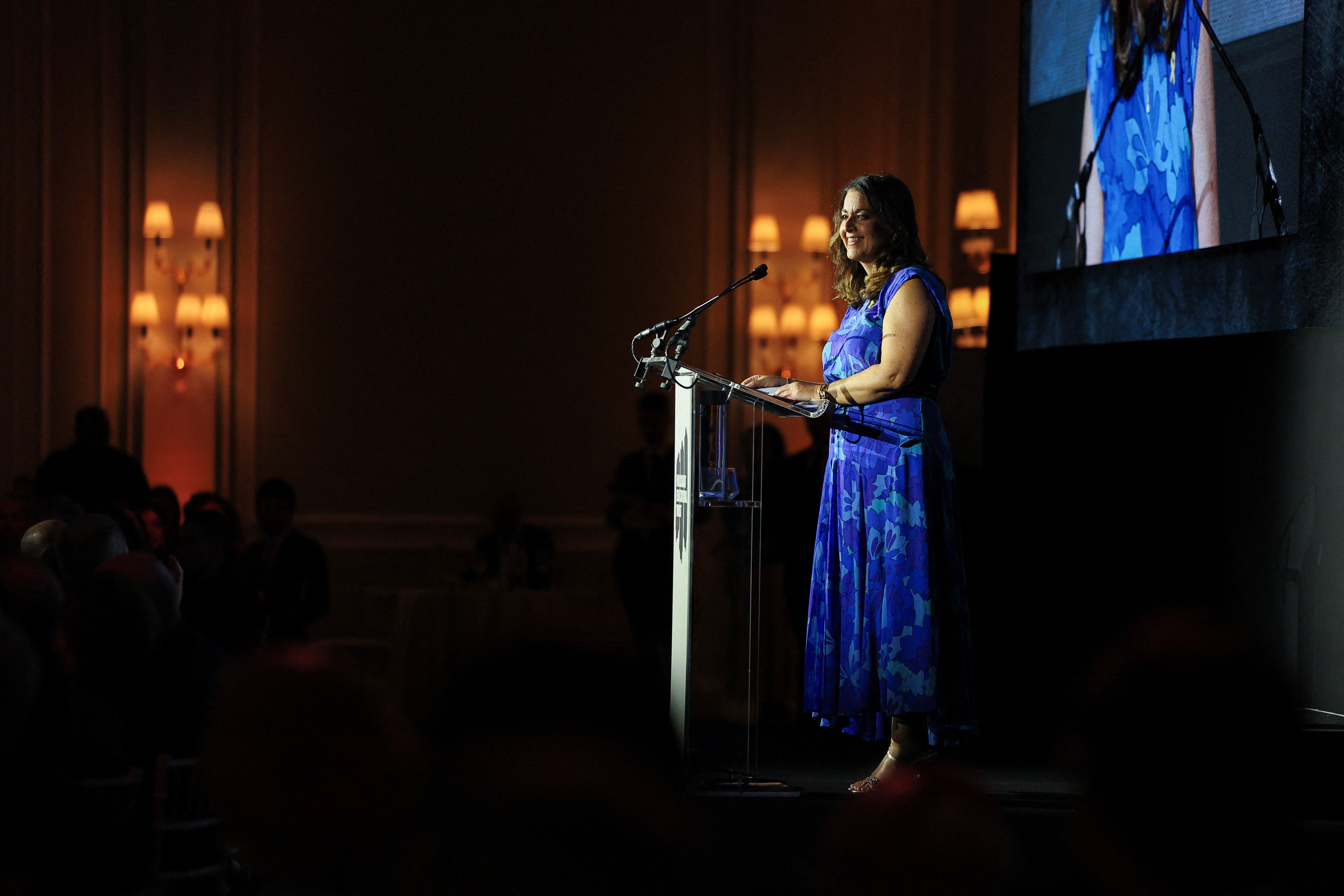
Holocaust education must keep step as survivors “will not be here forever”, a charity leader has warned nearly 80 years on from the liberation of Auschwitz.
We are at a “crucial juncture” on how to teach about the genocide as the number of eyewitnesses dwindle, chief executive of the Holocaust Educational Trust (HET) Karen Pollock told the PA news agency.
Holocaust Memorial Day on Monday will allow people to pay tribute to the six million murdered Jewish people, and understand the “horror of the Holocaust and the explicit, unprecedented nature and uniqueness of this episode in history”, she said.
This year is also an opportunity to see “our own responsibility” for passing on Holocaust stories as survivors are “becoming fewer and frailer in number”.
Preserving and retelling testimonies is key to education and HET is using artificial intelligence (AI) to let schoolchildren to have virtual conversations with survivors.
Education must also include understanding antisemitism and how the Nazis’ ambition to kill every Jew in Europe developed, Ms Pollock said.
Hamas’ October 7 attack on Israel made it “more crucial than ever that we understand the nature of extremism and the nature of this brutality”, she added.
Some 1,200 people, mostly civilians, were killed in the attack and another 250 were abducted.
The charity leader said: “I think however far away in history (the Holocaust) is, it’s still important that we really understand the nature of the antisemitism that took hold, the ideology of the Nazis wanting to wipe out every Jew in Europe.

“If they’d have got their own way that’s what would have happened, because it didn’t only take the Nazi perpetrators, but a lot of people being complicit or standing by and looking away.”
She added: “We want young people to understand the nature of persecution. It didn’t start with the gas chambers, didn’t even start with the brick through a window.
“It started with the segregation, it started with laws forbidding Jews to go to the cinema or sit on a park bench – othering them if you like, with the yellow star, so that they are visibly different.
“That hatred became rooted, deeply rooted and entrenched in society and led to… not just people perpetrating the horror of the Holocaust, but also others looking away.”
HET wants young people to question what it means for them today.
Antisemitism is “far more palpable” than usual with a rise in physical and online abuse Ms Pollock said, adding that some people fail to treat antisemitism as they would prejudice against other minorities.
Multiple police forces reported increases in antisemitism in the UK after the Israel-Hamas war began.
Ms Pollock said “misinformation is available at a click of a button” and young people are used to “digesting information in short, sharp” forms such as TikToks.
As a result, HET is emphasising the importance of critical thinking and sourcing accurate information as opposed to “jumping on a trend”.
This Holocaust Memorial Day marks 80 years since the end of the Holocaust. As survivors grow older with antisemitism continuing to surge, the responsibility to educate has never been more urgent.
— H.E.T. (@HolocaustUK) January 24, 2025
Please support us by sharing our content over the next few days #TheTimeIsNow pic.twitter.com/vtpyCTgfoV
“Trying to understand that complexity will help you become a stronger advocate for whatever it is you want.
“You can absolutely care about a particular cause without somehow being hateful about others”, she said.
The charity organises talks from survivors and for thousands of students to visit Auschwitz each year.
It aims to help them better understand the breadth and nature of the persecution, and then pass on what they have learnt to others.
HET has also developed a free digital programme that allows pupils to ask a survivor any question, and then use virtual reality (VR) headsets to explore sites described in the response.
A small number of survivors were asked up to 1,000 questions about their experiences, mostly sourced by students, for the Testimony 360 project, Ms Pollock said.
An AI search tool accesses pre-recorded answers from the survivor that are played back.
The survivor currently in schools for Testimony 360 is Manfred Goldberg who talks about Stutthof death camp and the Riga Ghetto.
“There is no replacement for an eyewitness standing in front of you, but it’s an answer alongside the young people visiting Auschwitz and people continuing the legacy”, Ms Pollock said.
The King will visit the concentration camp to mark Holocaust Memorial Day 2025.
Ms Pollock said: “Knowing that His Majesty the King is going to be there, and on behalf of Britain, I mean, you couldn’t ask for anything more.
“It sends such a strong message of support, and I know will mean so much to our survivors, who he has a special affection for, but they also hold (him) in such high regard, and also hold him in deep affection.”
The charity receives Government funding for its Lessons for Auschwitz project, which offers to send two 16 to 17-year-old students from every UK secondary school to visit the concentration camp, totalling nearly 3,000 young people a year.
About 100,000 young people are able to speak to a survivor each year, organised by HET.
Testimony 360 is sponsored by The Eyal and Marilyn Ofer Family Foundation in partnership with HET and the USC Shoah Foundation, which was set up by Steven Spielberg after the release of his film Schindler’s List.







